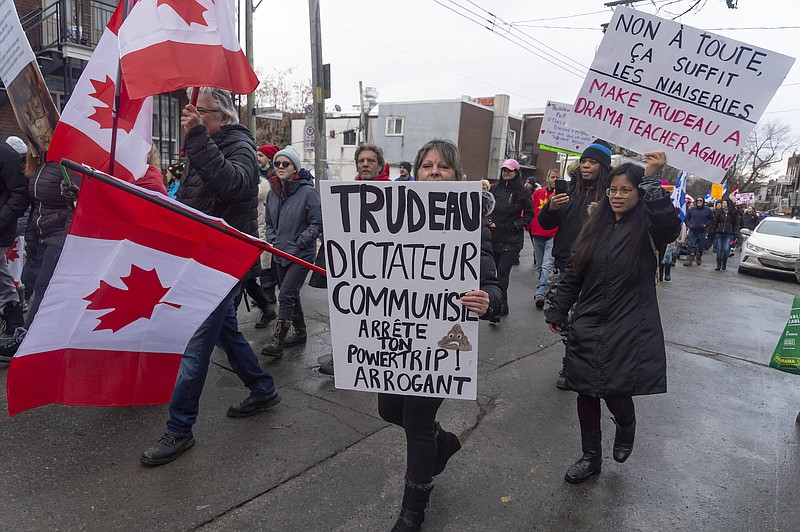WINDSOR, Ontario -- The busiest U.S.-Canada border crossing reopened late Sunday after protests against covid-19 restrictions closed it for almost a week, while Canadian officials held back from a crackdown on a larger protest in the capital, Ottawa.
Detroit International Bridge Co. said in a statement that "the Ambassador Bridge is now fully open allowing the free flow of commerce between the Canada and US economies once again." Esther Jentzen, spokeswoman for the company, said later that the bridge reopened to traffic at 10 p.m.
The demonstrations have reverberated across Canada and beyond, with similar convoys in France, New Zealand and the Netherlands. The U.S. Department of Homeland Security warned that truck convoys may be in the works in the United States.
The protest in Ottawa has paralyzed downtown, infuriated residents who are fed up with police inaction and turned up pressure on Prime Minister Justin Trudeau.
Windsor police said about 25 to 30 people were peacefully arrested and seven vehicles were towed just after dawn near the Ambassador Bridge that links their city -- and numerous Canadian automotive plants -- with Detroit.
The Ambassador Bridge remained closed for most of the day despite the breakup of the protest as a heavy snowstorm blanketed the area.
"Today, our national economic crisis at the Ambassador Bridge came to an end," said Windsor's Mayor Drew Dilkens before the bridge reopened. "Border crossings will reopen when it is safe to do so and I defer to police and border agencies to make that determination."
Only a few protesters had remained after police on Saturday persuaded demonstrators to move the pickups and cars they had used to block a crossing that sees 25% of all trade between the two countries.
U.S. President Joe Biden's administration on Sunday acknowledged the seemingly peaceful resolution to the demonstration, which it said had "widespread damaging impacts" on the "lives and livelihoods of people" on both sides of the border.
"We stand ready to support our Canadian partners wherever useful in order to ensure the restoration of the normal free flow of commerce can resume," Homeland Security adviser Liz Sherwood-Randall said in a statement.
In Ottawa, Mayor Jim Watson said Sunday that the city struck a deal with protesters who have jammed downtown streets for more than two weeks that will see them move out of residential areas in the next 24 hours.
Watson said he agreed to meet with demonstrators if they confine their protest to an area around Parliament Hill and move their trucks and other vehicles out of residential neighborhoods by noon today. A response from protest organizers suggested they would comply.
Watson added in his letter to protesters that residents are "exhausted" and "on edge" as a result of the demonstrations and warns that some businesses are teetering on the brink of permanent closure because of the disruptions.
OTTAWANS PUSH BACK
The ranks of protesters had grown to what police said were 4,000 demonstrators by Saturday, and a counterprotest of frustrated Ottawa residents attempting to block the convoy of trucks from entering the downtown emerged Sunday.
Clayton Goodwin, a 45-year-old military veteran who was among the counterprotesters, said it was time for residents to stand up against the protesters.
"I'm horrified that other veterans would be down there co-opting my flag, co-opting my service," said Goodwin, who is the CEO of the Veterans Accountability Commission, a nonprofit advocacy group. "It's a grift. The city was free. We're 92% vaccinated. We're ready to support our businesses."
Colleen Sinclair, another counterprotester, said the demonstrators have had enough time to have their discontent heard and need to move on -- with police force, if it comes down to it.
"They're occupiers. People are scared to go to work, too scared to leave their homes," she said. "This is not how you get your voice heard. This is domestic terrorism and we want you out of our city. Go home."
The city has seen similar expansions of the protest on past weekends, and loud music played as people milled about downtown where anti-vaccine demonstrators have been encamped since late January, to the frustration of local residents.
"It just feels like I'm living in a different country, like I'm in the States," said Shannon Thomas, a 32-year-old teacher. "It just makes me really sad to see all these people waving Canadian flags and acting like patriots when it's really the most sad and embarrassing thing I've ever seen."
Trudeau has so far rejected calls to use the military, but had said that "all options are on the table" to end the protests. Trudeau has called the protesters a "fringe" of Canadian society. Federal and provincial politicians have said they can't order police what to do.
Major Gen. Steve Boivin, commander of Canadian Special Operations Forces Command, said Sunday that two of his special forces soldiers were supporting the protests in Ottawa and were in the "process of being released" from service. Boivin said the activity goes against the military's values and ethics.
On Friday, a judge ordered an end to the blockade at the crossing in Windsor and Ontario Premier Doug Ford declared a state of emergency allowing for fines of almost $79,000 and up to one year in jail for anyone illegally blocking roads, bridges, walkways and other critical infrastructure.
Partial closures at the bridge started on Feb. 7 and by midweek the disruption was so severe that automakers began shutting down or reducing production. The standoff came at a time when the industry is already struggling to maintain production in the face of pandemic-induced shortages of computer chips and other supply-chain disruptions.
"We are protesting the government taking away our rights," said Windsor resident Eunice Lucas-Logan. "We want the restrictions removed. We have to wait to find out."
The 67-year-old has been out supporting the protest for the past four days. She said she appreciated that police have been patient.
On the other side of the country, a major truck border crossing between Surrey, British Columbia, and Blaine, Wash., was closed Sunday, a day after Canadian authorities said a few vehicles had breached police barricades and a crowd entered the area by foot.
The Royal Canadian Mounted Police said Sunday afternoon four people had been arrested for "mischief" during the protest. Some people who stayed overnight had packed up and left, but the border crossing and roads in the area remained closed.
A border blockade that began on Jan. 29 in Coutts, Alberta, north of Sweet Grass, Mont., remained in place as well. Police issued more than 50 traffic tickets Saturday and continued issuing them Sunday, Royal Canadian Mounted Police Cpl. Troy Savinkoff said.
Officers also intercepted and disabled three excavators that were being brought to the protest, Savinkoff said.
"Had those made their way to the blockade, it would only have compounded the unfortunate situation we're facing at the border," he said.
While the protesters are decrying vaccine mandates for truckers and other covid-19 restrictions, many of Canada's public health measures, such as mask rules and vaccine passports for getting into restaurants and theaters, are already falling away as the omicron surge levels off.
Meanwhile, Biden, in an interview Sunday with NBC's Lester Holt, struck a critical tone when asked about those likely to object to the mask mandate at the Super Bowl.
"I love how people talk about personal freedom," he said. "If you're exercising personal freedom, but you put someone else in jeopardy, their health in jeopardy, I don't consider that being very good with freedom."
'WE STAND FOR FREEDOM'
Canadians who have occupied downtown Ottawa sound a common note when asked about their motivation: Decisions about their health shouldn't be made by the government.
"We stand for freedom," said Karen Driedger, 40, who home-schools her children and attended protests in Ottawa and Windsor. "We believe that it should be everyone's personal decision what they inject into their bodies."
The refrain isn't new to a pandemic-weary world, two years after the covid-19 virus prompted curfews and closures, mask mandates, and debates over vaccine requirements. Still, the timing of the protests has raised some eyebrows, since they began just as many of the toughest pandemic-era restrictions were being lifted across Canada, the U.S. and Europe.
The protests that have fueled frustrations around the country and world have been aided by publicity and support from far-right and anti-vaccine groups. And influential Americans such as former U.S. President Donald Trump and billionaire entrepreneur Elon Musk have rallied behind the protesters.
Most Canadians have been supportive of the pandemic restrictions, which health officials have stressed are necessary to protect the public from a virus that has killed at least 5.8 million people globally. The vast majority of Canadians are vaccinated, and the covid-19 death rate is one-third that of the United States.
Trudeau has labeled the protesters a "fringe," and authorities have braced for violence because some have expressed hope that the rally will become the Canadian equivalent of the Jan. 6, 2021, riot at the U.S. Capitol by Trump supporters.
The Canadian "freedom convoy" was announced last month by a group founded by a QAnon conspiracy theory supporter and other organizers, and includes the ex-leader of Alberta's far-right Maverick Party.
Protesters who spoke to The Associated Press this week defended their actions and argued that they represent many more frustrated residents.
Don Stephens, a 65-year-old retired graphic designer, said he's come into Ottawa twice to show support for protesters there. He views them as representatives of a "silent majority that had been longing to have their voice heard."
Mat Mackenzie, a 36-year-old trucker from Ontario, said he's been among the protesters in Ottawa for 15 days, feeling "a duty" to show his opposition. Citizens should be in charge of making decisions about masks, vaccines and other covid mitigation efforts, not government officials, he said.
"I can tell you 90% of truckers here are likely vaccinated. We're here for freedom of choice," Mackenzie said. "And that's what we're here to fight for."
Michael Kempa, a criminology professor at the University of Ottawa, said there are two faces of the protest. It isn't just about vaccine mandates and other covid restrictions; organizers have said they want to oust Trudeau's Liberal government and be part of forming a new one, he said.
"In many ways, the friendly face protesters are acting as the foot soldiers of the organizers," Kempa said. "We are seeing a huge amount of misinformation. People who are legitimately angry are being manipulated by the protest leadership."
Many Canadians have been angered by the crude behavior of some demonstrators. Some urinated on the National War Memorial and danced on the Tomb of the Unknown Soldier, while others carried signs and flags with swastikas and used the statue of Canadian hero Terry Fox to display an anti-vaccine statement, sparking widespread condemnation.
PROTESTS ELSEWHERE
The images of protests across Canada have ignited copycats elsewhere.
In Paris, police prevented a threatened blockade of the French capital on Saturday. But a few dozen vehicles were able to disrupt traffic on the famed Champs-Elysees, prompting police to fire tear gas to disperse the crowd.
"The convoys are for the restoring of our liberties," said Pierre-Louis Garnier, a 64-year-old who attended a protest on Friday in Paris to welcome an anticipated convoy that never materialized.
In the Netherlands, dozens of trucks and other vehicles, some waving Canadian flags, have descended on The Hague, the historic Dutch parliamentary complex.
"We are living now in police state," said Hans Evenstain, a 76-year-old protester said Sunday. "That's not a good life anymore. We want to move freely and that's why we are here for us and for our children and our grandchildren."
In Belgium, federal police were urging people to avoid Brussels today, when a convoy is expected to gather in the country's capital, and the headquarters of the 27-nation European Union.
In the New Zealand capital of Wellington, authorities tried blasting Barry Manilow songs and the 90s dance hit "Macarena" on loop in an unsuccessful attempt to break up a convoy of protesters that has been encamped outside Parliament for nearly a week.
"All I want is the mandates lifted, and freedom of choice," said Kacheeya Scarrow, who drove her van about 235 miles from the city of Taupo to support the protest. "I'm not anti-vax, I'm not pro-vax. Everybody should have the right to choose what they want to do with their own body."
In Windsor, where protesters had blocked the entrance to the Ambassador Bridge that is a crucial conduit for the auto industry in both the U.S. and Canada, police moved to end the demonstration Sunday, arresting about a dozen protesters and beginning to tow vehicles.
Before Sunday's crackdown, the shutdown often had the feel of a block party.
Protesters milled about, carrying Canadian flags affixed to the ends of hockey sticks while music blared and food was handed out. They put up signs bearing slogans such as "Freedom Is Essential," "Say No To Mandatory Vaccines" and "End Mandates."
Troy Holman, a 32-year-old Windsor resident who has been at the protest every day since its start Feb. 7 , said he believes the government overreached with its covid-19 restrictions, which negatively affected his wife's small business.
"If we weren't doing something such as this, no one would pay attention to us," he said Friday. "Unfortunately, we have to be here, because this is what's going to get the attention of the government."
Information for this article was contributed by Rob Gillies, Corey Williams, Ted Shaffrey, Gene Johnson, Mike Householder, Kathleen Foody, Elaine Ganley, Thomas Adamson and Nick Perry of The Associated Press.
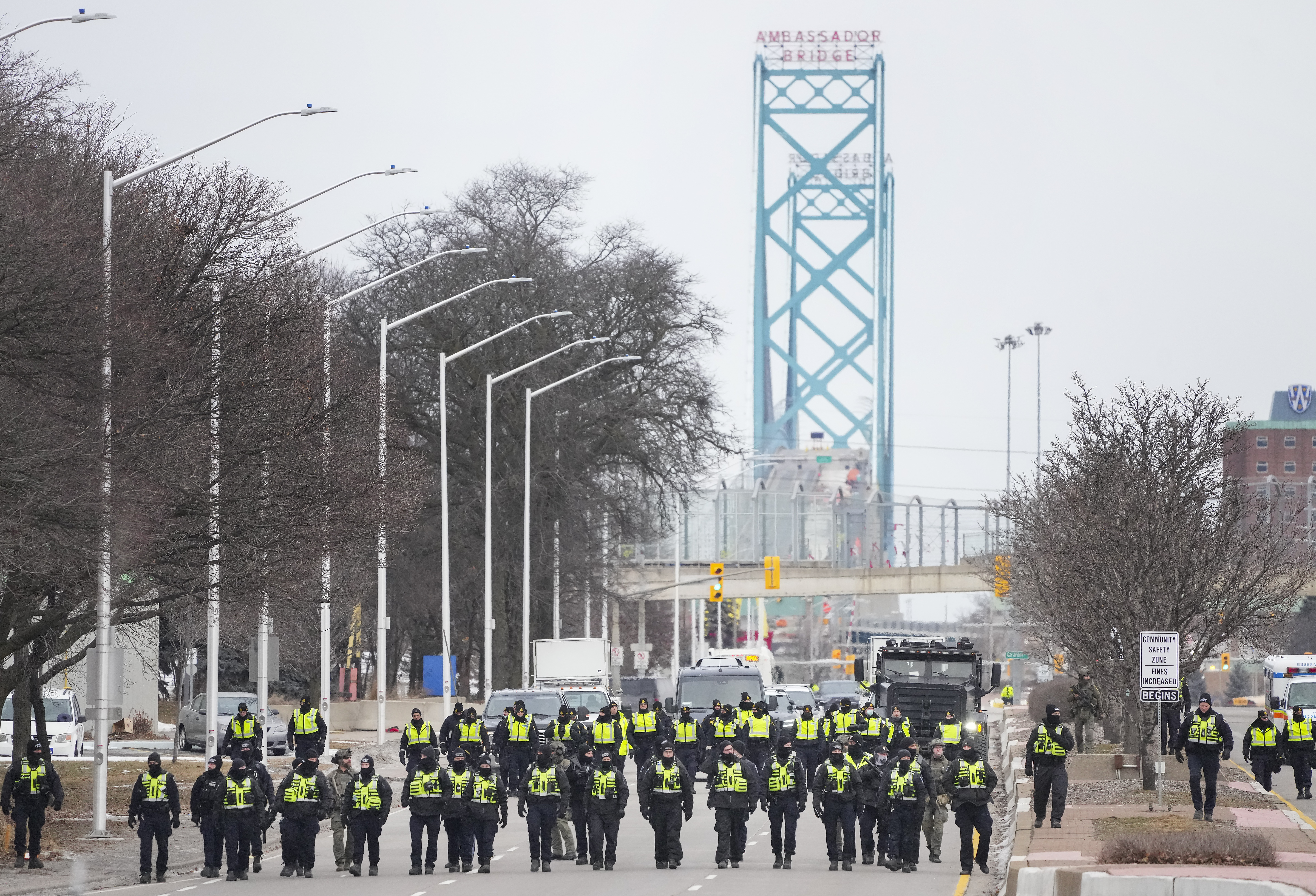 Police walk the line to remove all truckers and supporters after a court injunction gave police the power to enforce the law after protesters blocked the access leading from the Ambassador Bridge, linking Detroit and Windsor, as truckers and their supporters continue to protest against COVID-19 vaccine mandates and restrictions in Windsor, Ontario, Sunday, Feb. 13, 2022. (Nathan Denette/The Canadian Press via AP)
Police walk the line to remove all truckers and supporters after a court injunction gave police the power to enforce the law after protesters blocked the access leading from the Ambassador Bridge, linking Detroit and Windsor, as truckers and their supporters continue to protest against COVID-19 vaccine mandates and restrictions in Windsor, Ontario, Sunday, Feb. 13, 2022. (Nathan Denette/The Canadian Press via AP)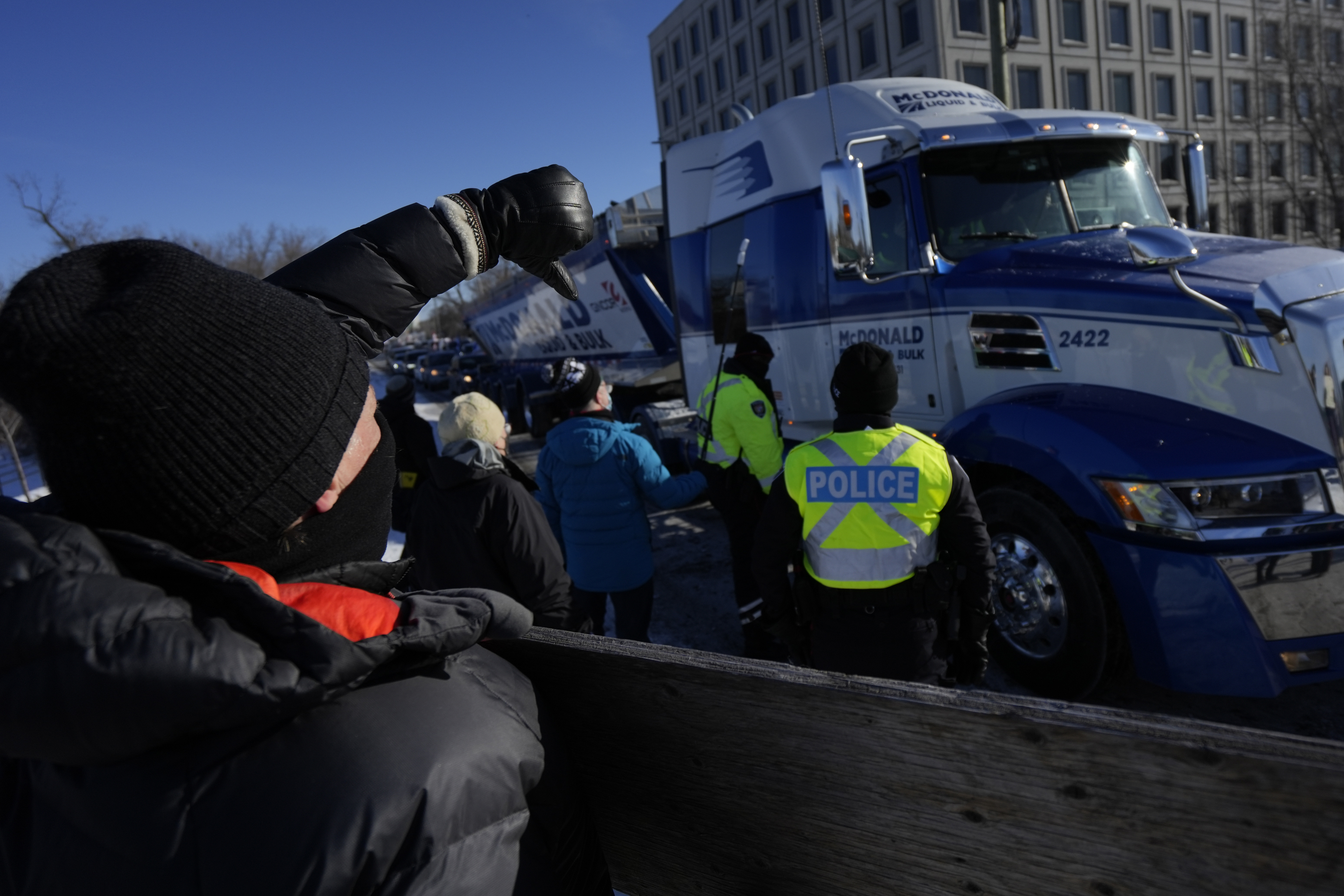 A resident participating in a counter protest give the thumbs down to a truck that was allowed to pass, as counter protesters stop vehicles from driving in a convoy en route to Parliament Hill, on the 17th day of a protest against COVID-19 measures that has grown into a broader anti-government protest, in Ottawa, Sunday, Feb. 13, 2022. (Justin Tang/The Canadian Press via AP)
A resident participating in a counter protest give the thumbs down to a truck that was allowed to pass, as counter protesters stop vehicles from driving in a convoy en route to Parliament Hill, on the 17th day of a protest against COVID-19 measures that has grown into a broader anti-government protest, in Ottawa, Sunday, Feb. 13, 2022. (Justin Tang/The Canadian Press via AP)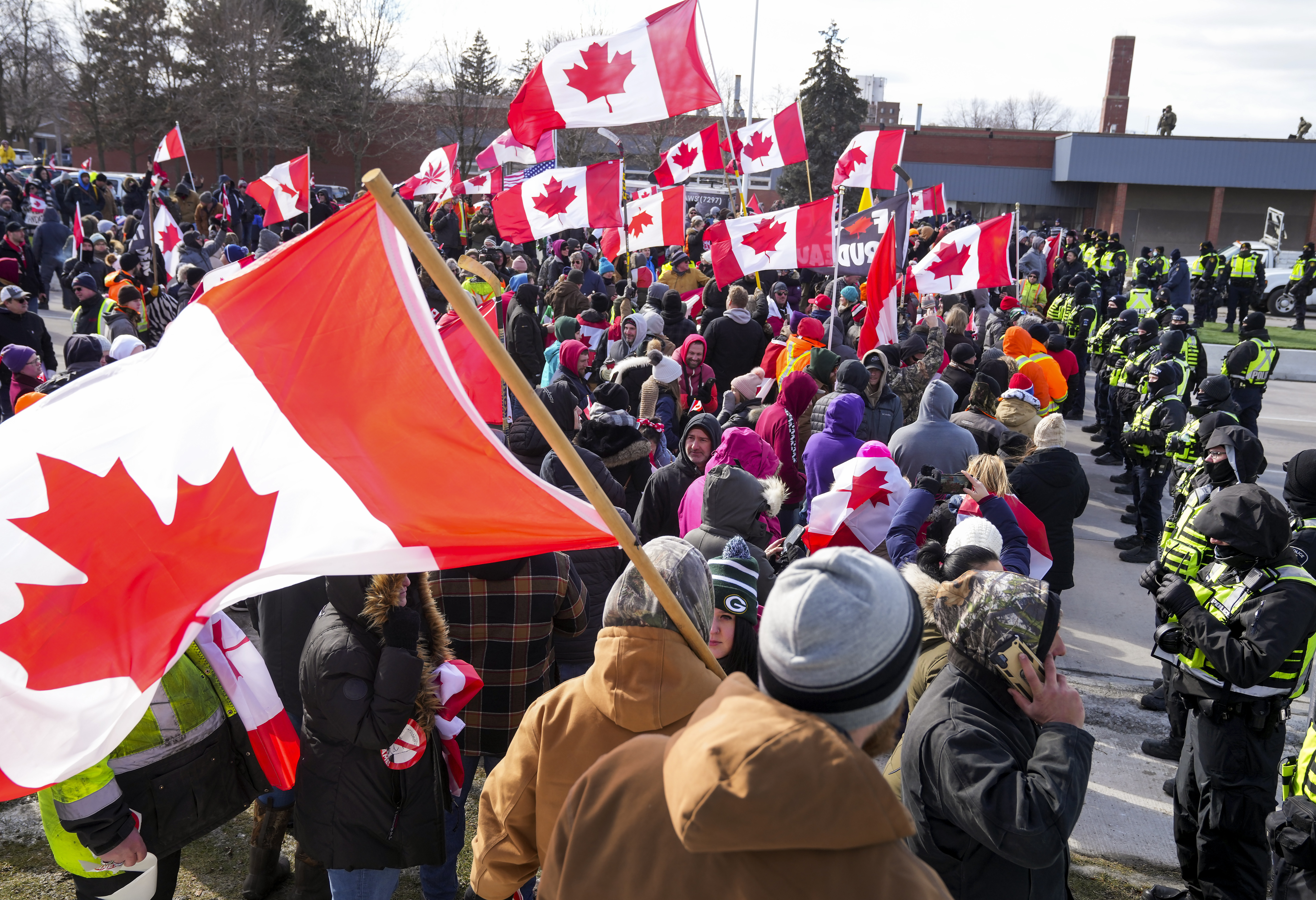 Police officers hold a line as protesters against COVID-19 restrictions march in Windsor, Ont., Saturday, Feb. 12, 2022. The demonstrations at the Ambassador Bridge, downtown Ottawa and elsewhere have targeted vaccine mandates and other coronavirus restrictions and vented fury toward Prime Minister Justin Trudeau, who has called the protesters a “fringe” of Canadian society. (Nathan Denette/The Canadian Press via AP)
Police officers hold a line as protesters against COVID-19 restrictions march in Windsor, Ont., Saturday, Feb. 12, 2022. The demonstrations at the Ambassador Bridge, downtown Ottawa and elsewhere have targeted vaccine mandates and other coronavirus restrictions and vented fury toward Prime Minister Justin Trudeau, who has called the protesters a “fringe” of Canadian society. (Nathan Denette/The Canadian Press via AP)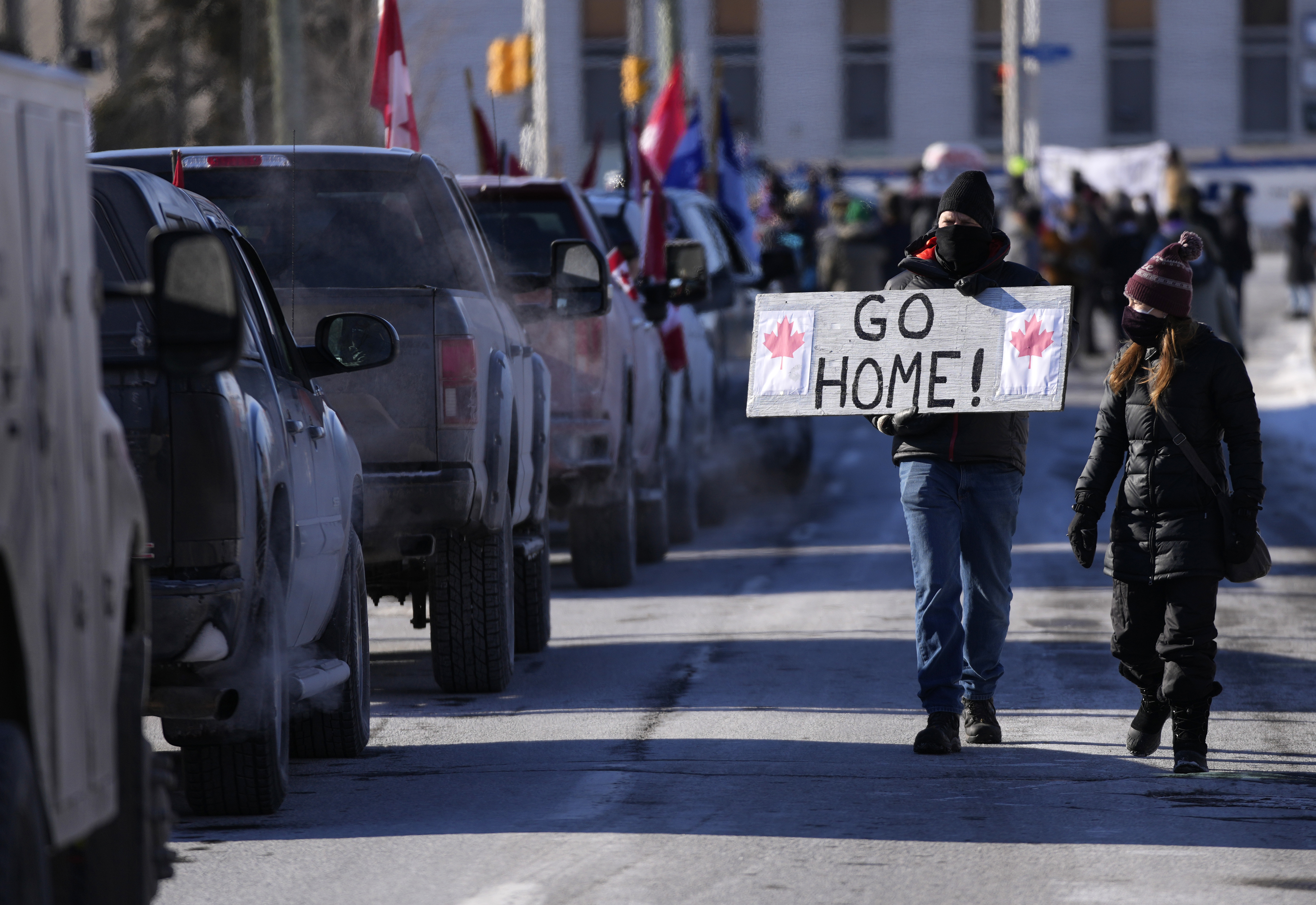 A resident holds a sign towards protesters as they participate in a counter protest to stop vehicles from driving in a convoy en route to Parliament Hill, on the 17th day of a protest against COVID-19 measures that has grown into a broader anti-government protest, in Ottawa, Sunday, Feb. 13, 2022. (Justin Tang/The Canadian Press via AP)
A resident holds a sign towards protesters as they participate in a counter protest to stop vehicles from driving in a convoy en route to Parliament Hill, on the 17th day of a protest against COVID-19 measures that has grown into a broader anti-government protest, in Ottawa, Sunday, Feb. 13, 2022. (Justin Tang/The Canadian Press via AP)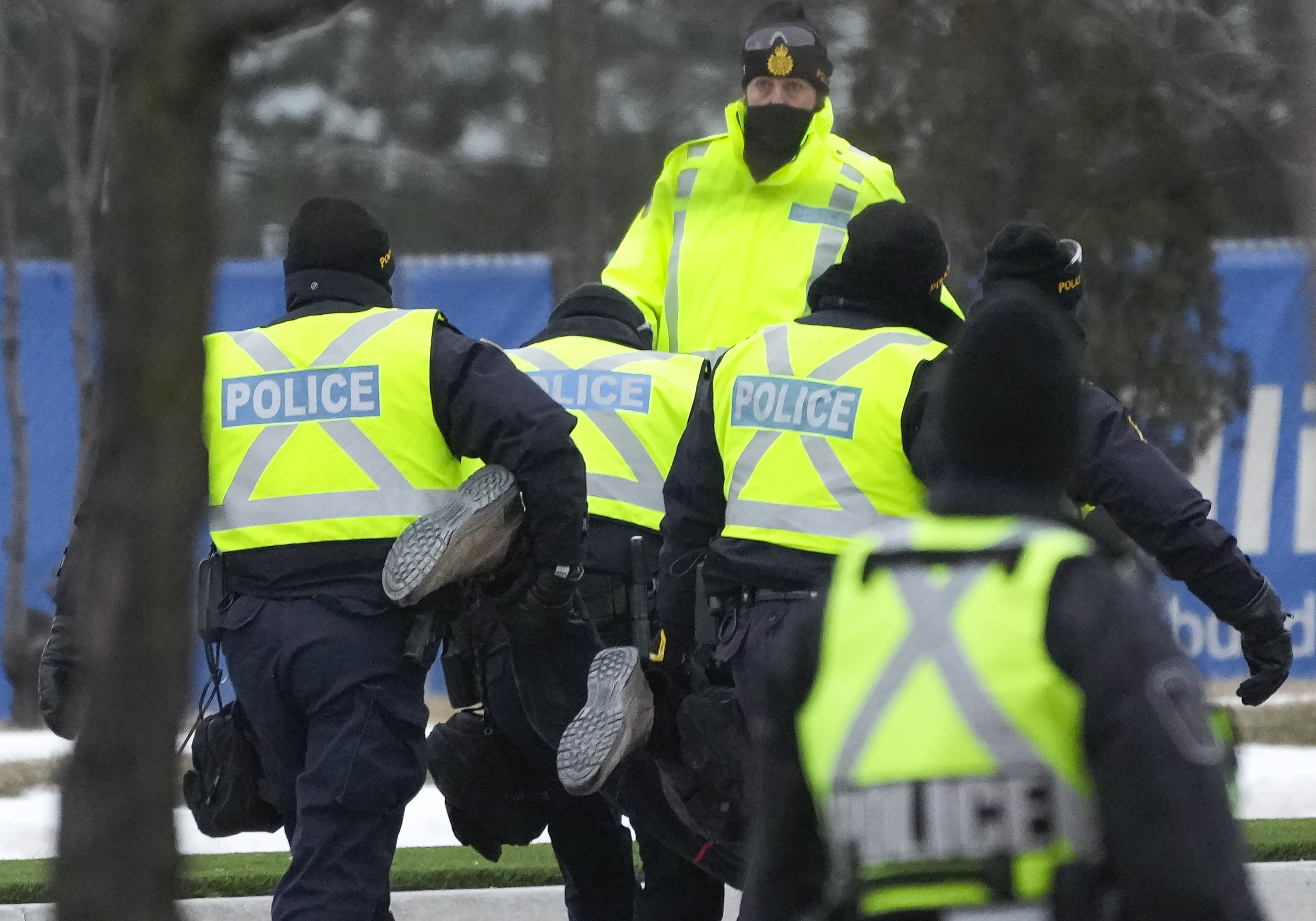 Police arrest a person as they walk the line to remove all truckers and supporters after a court injunction gave police the power to enforce the law after protesters blocked the access leading from the Ambassador Bridge, linking Detroit and Windsor, as truckers and their supporters continue to protest against COVID-19 vaccine mandates and restrictions in Windsor, Ontario, Sunday, Feb. 13, 2022. (Nathan Denette/The Canadian Press via AP)
Police arrest a person as they walk the line to remove all truckers and supporters after a court injunction gave police the power to enforce the law after protesters blocked the access leading from the Ambassador Bridge, linking Detroit and Windsor, as truckers and their supporters continue to protest against COVID-19 vaccine mandates and restrictions in Windsor, Ontario, Sunday, Feb. 13, 2022. (Nathan Denette/The Canadian Press via AP)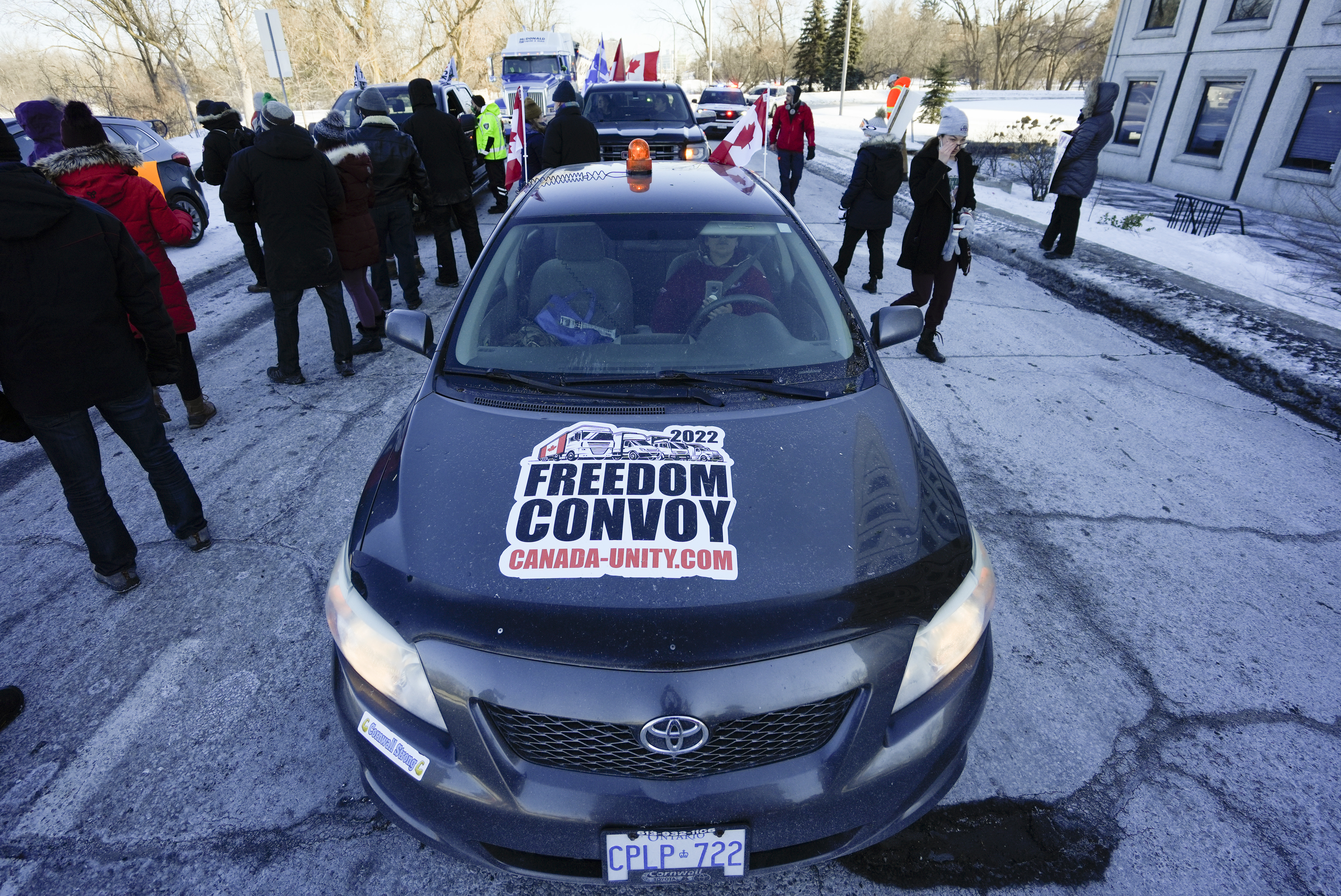 A vehicle with a sticker for the group Canada Unity's "Freedom Convoy" is stopped by counter protesters stopping vehicles from driving in a convoy en route to Parliament Hill, on the 17th day of a protest against COVID-19 measures that has grown into a broader anti-government protest, in Ottawa, on Sunday, Feb. 13, 2022. (Justin Tang/The Canadian Press via AP)
A vehicle with a sticker for the group Canada Unity's "Freedom Convoy" is stopped by counter protesters stopping vehicles from driving in a convoy en route to Parliament Hill, on the 17th day of a protest against COVID-19 measures that has grown into a broader anti-government protest, in Ottawa, on Sunday, Feb. 13, 2022. (Justin Tang/The Canadian Press via AP)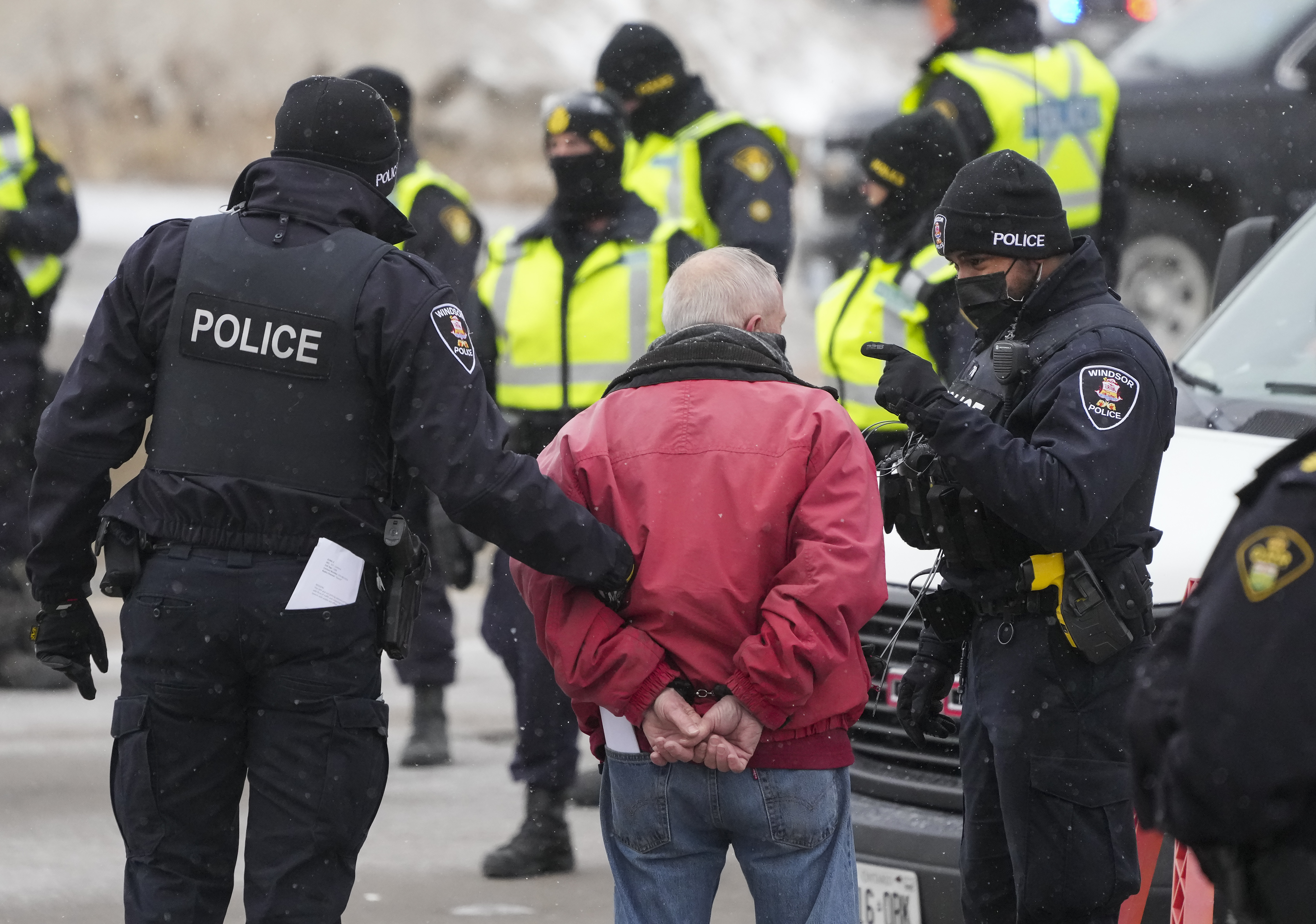 A protester is arrested by as police remove truckers and supporters after a court injunction gave police the power to enforce the law after blocking the access leading from the Ambassador Bridge, linking Detroit and Windsor, as truckers and their supporters continue to protest against the COVID-19 vaccine mandates and restrictions in Windsor, Ontario, Sunday, Feb. 13, 2022. (Nathan Denette/The Canadian Press via AP)
A protester is arrested by as police remove truckers and supporters after a court injunction gave police the power to enforce the law after blocking the access leading from the Ambassador Bridge, linking Detroit and Windsor, as truckers and their supporters continue to protest against the COVID-19 vaccine mandates and restrictions in Windsor, Ontario, Sunday, Feb. 13, 2022. (Nathan Denette/The Canadian Press via AP)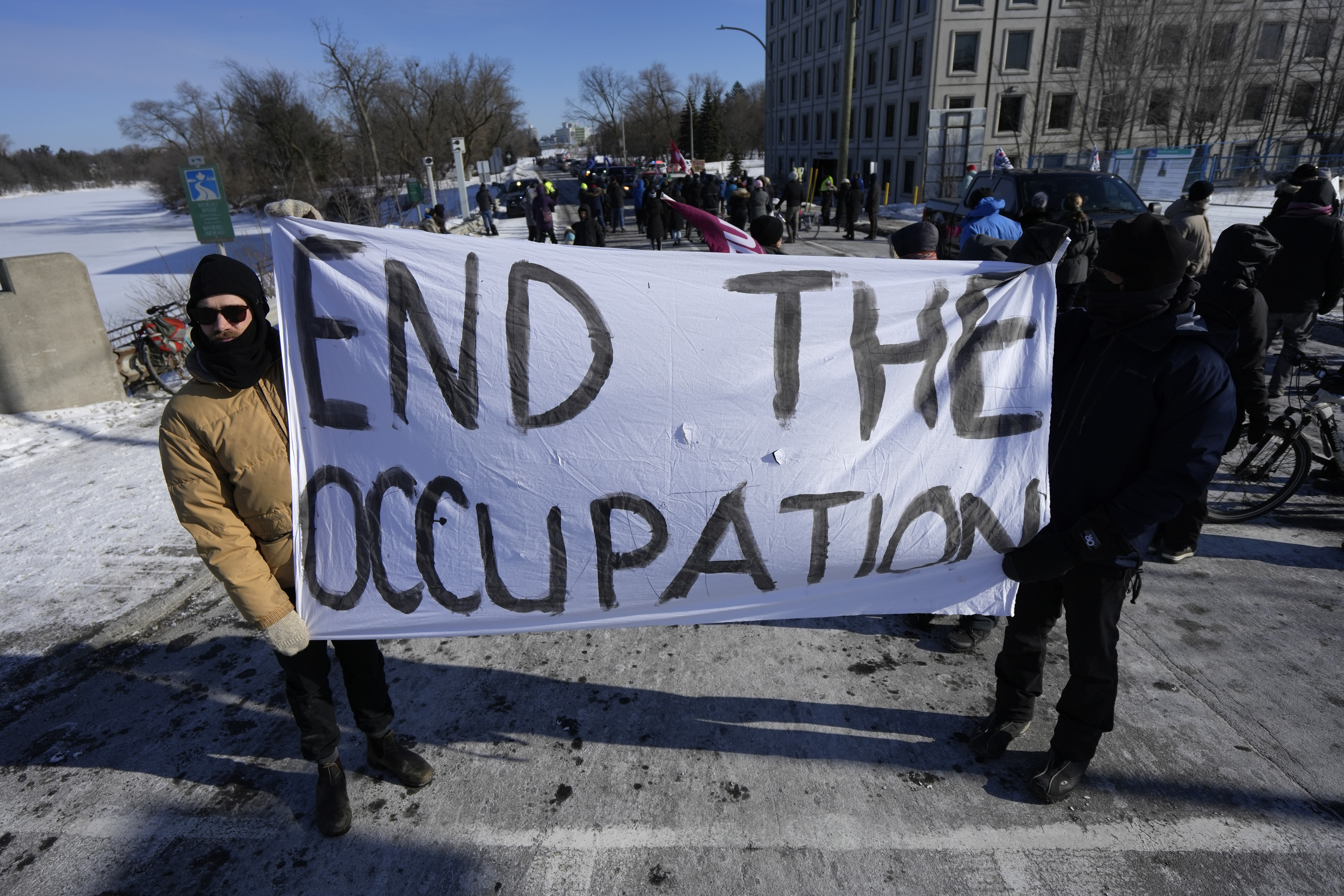 People hold a sign as residents participate in a counter protest to stop vehicles from driving in a convoy en route to Parliament Hill, on the 17th day of a protest against COVID-19 measures that has grown into a broader anti-government protest, in Ottawa, Sunday, Feb. 13, 2022. (Justin Tang/The Canadian Press via AP)
People hold a sign as residents participate in a counter protest to stop vehicles from driving in a convoy en route to Parliament Hill, on the 17th day of a protest against COVID-19 measures that has grown into a broader anti-government protest, in Ottawa, Sunday, Feb. 13, 2022. (Justin Tang/The Canadian Press via AP)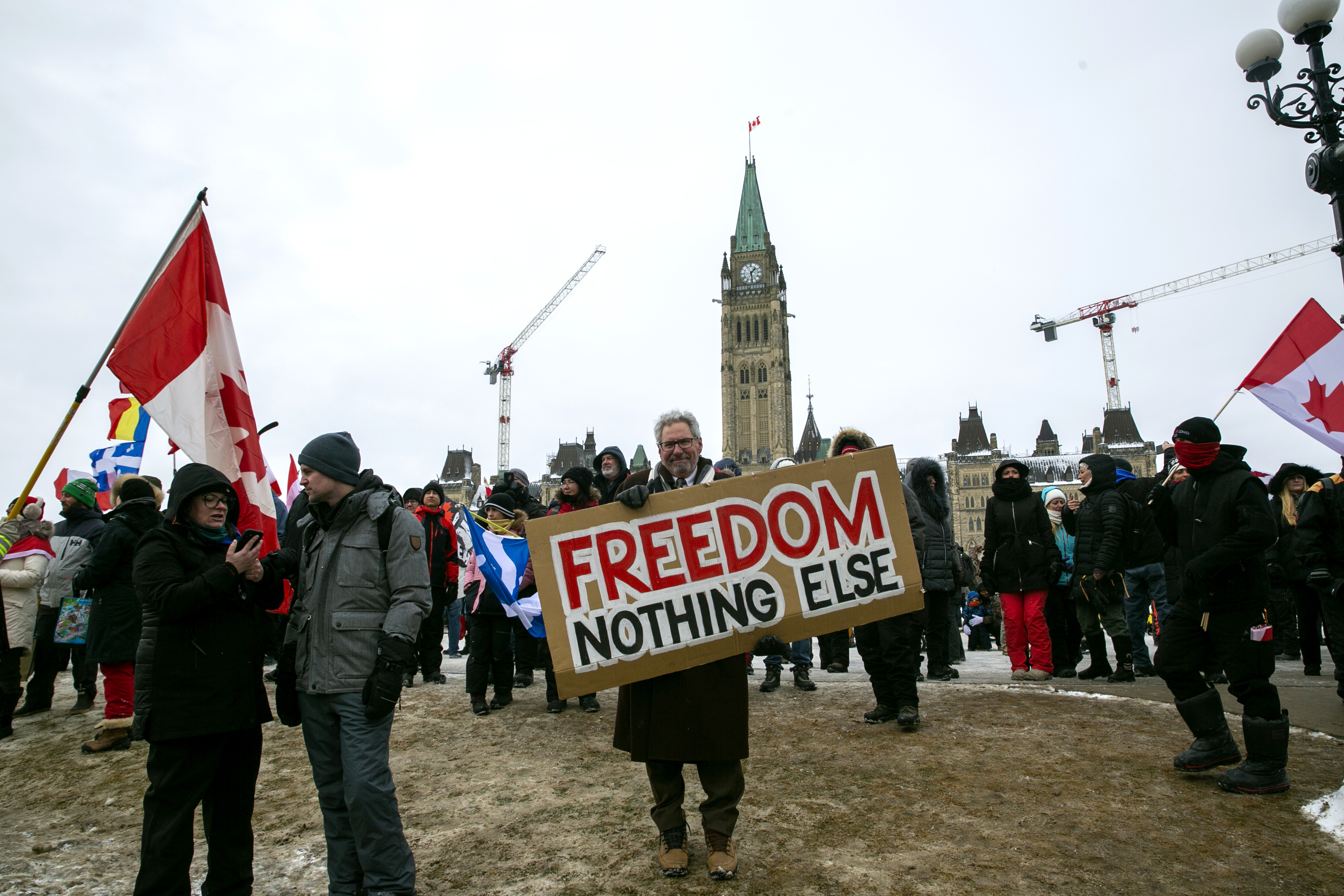 Don Stephens, 65, a retired graphic designer, holds a sign on Parliament Hill to support trucks lined up in protest of COVID-19 vaccine mandates and restrictions in Ottawa, Ontario, on Saturday, Feb. 12, 2022. Stephens said he’s come into Ottawa twice to show support for protesters there. He views them as representatives of a “silent majority that had been longing to have their voice heard.” (AP Photo/Ted Shaffrey)
Don Stephens, 65, a retired graphic designer, holds a sign on Parliament Hill to support trucks lined up in protest of COVID-19 vaccine mandates and restrictions in Ottawa, Ontario, on Saturday, Feb. 12, 2022. Stephens said he’s come into Ottawa twice to show support for protesters there. He views them as representatives of a “silent majority that had been longing to have their voice heard.” (AP Photo/Ted Shaffrey)Gallery: Canadians' protests enter 17th day
